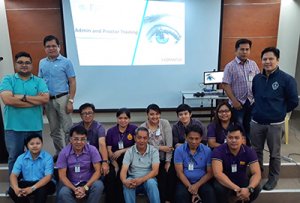NBI – First Gov’t Agency in Philippines to Purchase EyeDetect
The National Bureau of Investigation plans to use EyeDetect for screening and field investigations.

From left, bottom to top: Abie Laguitan (sitting) of Truth Verifier Systems, John Exos Nulud of EXpress Order System, and Lolito Basilio, Head of the NBI Polygraph Dept. Basilio and his team (the remaining in the picture) were trained in January at the NBI Headquarters in Manila in how to use the EyeDetect technology to detect deception.
MANILA, Philippines – March 22, 2019 – The National Bureau of Investigation (NBI) is the first government agency in the Philippines to adopt EyeDetect by Converus. The agency, which is the equivalent of the U.S. FBI, plans to use it for screening and in field investigation cases.
NBI, formed in 1936, operates under the PhilippineDepartment of Justice and has territorial and case jurisdiction. Converus Service Partner EXpress Order System (EXOS) trained the NBI Polygraph Dept. staffin January at the NBI Headquarters in Manilaon how to administer EyeDetect tests and manage reports and test scores. EXOS Marketing Manager John Exos and Polygraphist Abie Laguitan of Truth Verifier Systems — the country’s first and most-awarded private detective and lie detector company — provided the training. TVSI is the sister company of EXOS.
“This will prove to be a valuable and useful update to NBI’s polygraph division technologies,” said Nulud. “The NBI staff were excited to be trained in EyeDetect. The agency will benefit tremendously from this technology as they use it to identify dishonest people in their ranks. It will make this government agency more secure by having more loyal employees.”
EyeDetect is used by more than 500 customers in 40 countries to screen job applicants, employees, parolees, and immigrants — as well as law enforcement and public safety personnel —for involvement in drug use, robbery, sexual assault, infidelity, murder, sabotage, espionage, terrorism and other criminal and unethical behaviors. It’s also used to conduct diagnostic (single issue) testing for criminal or civil cases.
“The brain and eyes respond to deception,” explained Nulud. “The greater the consequences of the lie, the greater the cognitive load. This affects the eyes.”
An EyeDetect test starts with the examinee sitting in front of an EyeDetect computer with an infrared eye-tracking camera mounted below the monitor. The eye-tracker takes 60 measurements per second of involuntary eye behaviors — including changes in pupil dilation, blink rate, and other eye movements — to detect deception while the examinee answers a series of true/false questions. At the conclusion of the test, the data are uploaded to a secure cloud server and analyzed by computer algorithms. In less than 5 minutes, the person is scored as either credible or deceptive.
EXOS plans to demonstrate EyeDetect to other government agencies, as well as attorneys, private investigators and clergy. Nulud says EyeDetect can also be used to test sex offenders for parole, probation or therapy program violations. In addition, lie detectors can be used in criminal or civil cases, addiction therapy, drug testing, iron man and body building competitions, as well as fishing tournaments.
“I’m always looking for disruptive innovation, and I was impressed by the EyeDetect technology from the moment it was first demonstrated to me,” said Nulud. “I believe EyeDetect has the potential to revolutionize the lie detection industry in the Phillipines, if not worldwide.”
Converus released the EyeDetect technology in 2014. Unlike polygraph, there are no cables and sensors attached to the examinee. And since the test is automated, the potential for human bias is eliminated.
“There are five main advantages to the EyeDetect technology,” said Nulud. “It’s accurate, fast, affordable, unbiased and nonintrusive.”
EyeDetect can be used for either screening tests or investigations. The investigative test takes 15 minutes. An initial field study shows EyeDetect’s DLC test is more than 90 percent accurate. The screening test takes 30 minutes and is 86 percent accurate. Polygraph exams take at least 90 minutes to three hours to conduct, and reports can sometimes take hours to receive.
Nulud says EyeDetect can not only help local law enforcement make better hiring decisions but also gives local churches a tool for quickly determining the truth in any alleged scandals. His company also plans to reach out to banks and business-process-outsourcing companies, which he feels can benefit from the ease and the speed of the results that EyeDetect offers.
“Government agencies benefit greatly from using the most current technological advances for detecting deception,” said Converus President and CEO Todd Mickelsen. “NBI, as well as other law enforcement agencies, will find EyeDetect helps them hire a more honest, trustworthy staff. It will also prove very useful for investigative cases.”
For more information about Converus, visit: converus.com
# # #
About Converus®
Converus provides scientifically validated credibility assessment technologies. EyeDetect® detects deception at 86-90% accuracy in 15-30 minutes by analyzing eye and other behaviors. IdentityDetect® detects falsified identities at 91% accuracy in about 1-3 minutes by analyzing subtle variations in the motor nervous system responses. These technologies help protect countries, corporations and communities from corruption, crime and threats. Converus is headquartered in Lehi, Utah, USA. Visit: www.converus.com
_____________________________________________
Converus Press Contact: Jeff Pizzino, APR /+1 480-606-8292

